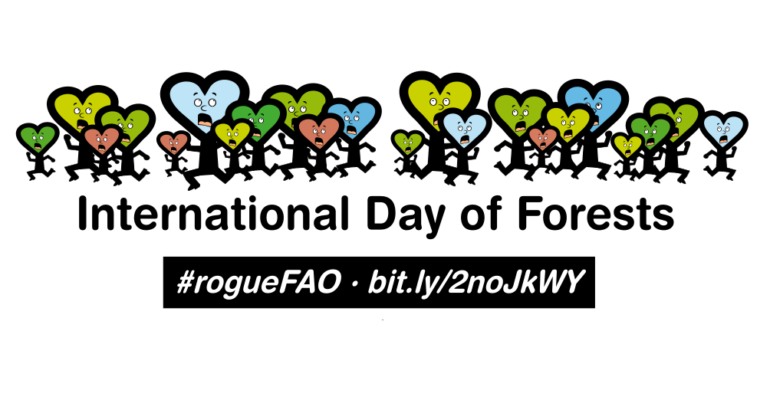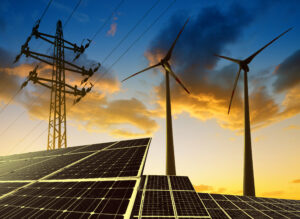Open NGO letter on FAO’s International Day of Forests 2017
To FAO Director-General Graziano da Silva and to Assistant Director-General Castro Salazar.
Original PDF letter with signatory logos.
The FAO and the Collaborative Partnership on Forests have chosen to use the International Day of Forests 2017 to promote the use of wood for energy, calling forests “nature’s power house”. As the key messages of the day point out, forests are a traditional source of energy but are also considered to be the world’s biggest source of renewable energy.
Unfortunately, this message ignores the serious negative impacts of growing bioenergy use on the environment, local communities, people’s health, the climate and, of course, our forests. The ongoing political push to significantly increase the use of forests as fuel for energy production – as an attempt to mitigate climate change – is based on flawed science and can create more problems than solutions.
In particular, the dramatic increase in the use of wood in industrial-scale energy installations is already contributing to greater climate pollution and forest destruction – and Europe is leading the way. The EU’s existing renewable energy targets are expected to create demand for roughly 100 million cubic meters more of wood to be used for energy,[1] which in turn will significantly reduce the capacity of forests to sequester and store carbon[2].
Large-scale demand for wood fuel energy can never be met by “wood wastes” alone – an industry claim that has been repeatedly debunked. Rather, the biomass industry relies increasingly on quality wood, sourced directly from forests, often even shipped to European energy installations all the way from the United States and Russia. Other countries, such as Japan, South Korea and Australia are following suit.
In response, speculative investments are already taking place and analysts are predicting[3] an expansion of wood plantations (i.e. rapidly growing monocultures) in Africa and South America. This raises major concerns about further land grabbing, human rights violations, deforestation and forest degradation, and impacts on local food, water and energy security.
The common factor in these global developments is that they are all based on ill-designed policies that erroneously assume that the use of wood for energy has no negative impacts on the climate i.e. zero emissions. The assumption that all bioenergy is “carbon neutral” has been widely recognised as scientifically false and a misinterpretation of the guidance of the International Panel on Climate Change[4]. Groups such as the Scientific Committee of the European Environmental Agency[5], Chatham House[6], the Science Advisory Board of the US Environmental Protection Agency[7] and articles in highly esteemed, peer-reviewed journals, such as Science[8] and Energy Policy[9] have all rejected this carbon neutrality myth. Yet the FAO notably ignores these findings and incorporates the “carbon neutrality myth” in messaging and promotion of forests as major energy sources.
In addition, the continuing use of wood fuel for cooking and heating, especially in developing countries but also in Europe[10] and elsewhere, is recognised to be a major health hazard. This is something that the UN Sustainable Development Goals[11] identify as a problem, rather than a solution, for a clean energy future.
The rapidly growing use of wood for energy for electricity, heat and fuel risks serious negative impacts on the environment, climate and health, biodiversity as well as the rights and livelihoods of indigenous and forest dependent peoples. Moreover, it is based on a false interpretation of science and research. It is therefore not only surprising, but disappointing that the FAO is promoting this form of energy on the International Day of Forests, with no reflection on the imminent risks.
The undersigned organisations therefore urge the FAO to:
- Cease endorsement and promotion of large scale biomass use for energy
- Stop the misleading presentation of all woody biomass as ‘carbon neutral’ and ‘sustainable’
- Support resource efficient use of wood and a hierarchy of wood uses, which can contribute to mid- and long-term carbon storage
- Refocus its energies on the conservation, regeneration and restoration of biodiverse forest ecosystems, which will actually contribute to climate change mitigation in a more comprehensive and inclusive way that goes beyond the burning of trees.
Yours sincerely,
Africa Europe Faith and Justice Network
BirdLife Europe and Central Asia
BUND Friends of the Earth Germany
The Finnish Association for Nature Conservation
Focus Association for Sustainable Development
Logon de GIERI
Fédération Inter-Environnement Wallonie
Instytut Spraw Obywatelskich (INSPRO)
Institute for Sustainable Development (ISD)
NOAH Friends of the Earth Denmark
Natural Resources Defense Council
Partnership for Policy Integrity
Southern Environmental Law Center
Transformasi untuk Keadilan Indonesia
ZERO – Associação Sistema Terrestre Sustentável
[1] National Renewable Energy Action Plans of EU member states project the use of forest biomass to increase from 336 M m3 in 2006 to 431 M m3 by 2020 European Commission SWD(2014) 259 final
[2] EU Energy, Transport and GHG Emissions – Trends to 2050, Reference Scenario 2013
[3] A new look at land-grabs in the global South linked to EU biomass policies, Biofuelwatch 2014
[4] IPCC Task Force on National Greenhouse Gas Inventories, FAQ Q2-10
[5] European Environmental Agency, Scientific Committee Opinion 2011
[7] Science Advisory Board Review of EPA’s Accounting Framework for Biogenic CO2 Emissions, 2011
[8] Searchinger et al. Science (2009) 326:5952
[9] Haberl et al. Energy Policy (2012) 45
[10] European Environmental Agency 2016
[11] Sustainable Development Goal 7: Energy
Banner photo: © Biofuelwatch




